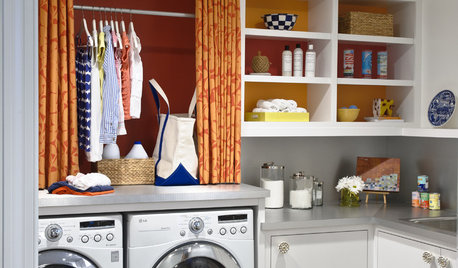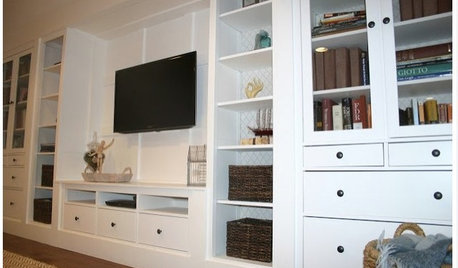Is it dumb to be my own general contractor?
I contacted a general contractor who did some work for me previously. It's been two weeks and he hasn't got back to me with a quote. Actually, I'm glad he hasn't got back to me.
I really wanted to know what things would cost so I called a tile setter to see what the tile would cost me. Not only are their rates less expensive but they recommended that I lay the tile down over cement rather than the cement board the GC talked about.
I know I need the following to get started:
- Porcelain tile in the kitchen and foyer (existing vinyl and linoleum in these spaces)
- Cabinets removed and new cabinets installed
- Gas line for stove (currently using electric)
- Water line for refrigerator
- New trim work
- Painting
- New countertop & sink installed
- Appliances installed
The only thing I don't know is what needs to be done in what order.
Is it dumb to handle this on my own or should I find another general contractor?
Comments (21)
aprilmack
Original Author12 years agolast modified: 9 years agoAlso, I probably don't have a sufficient budget at this point. Could you guys also advise me on what things I NEED to have a budget for before getting started. I could probably piece this project together in 3-4 months.
The tile quotes that I received (2 at this point) vary widely. One guy said $3000 + materials. The other guy said $5400 + materials. I have about 450 sq ft. Which price seems to be more in the right ballpark? Both would use a layer of cement.
KitchenCabinetKings
12 years agolast modified: 9 years agoYou will save money being your own contractor, but you will be trading your time. Additionally, if you do not have experience in the trades you are looking to hire you may do yourself a disservice by making mistakes or hiring the wrong sub-contractors.
Obviously the first general contractor is out of the equation due to the time elapsed waiting for a quote, but I wouldn't rule out looking for another one in order to save time and the headache of running a construction project on top of your daily schedule.
Here is a link that might be useful: Kitchen Cabinet Kings Kitchen & Bathroom Remodeling Blog
Related Professionals
El Dorado Hills Kitchen & Bathroom Designers · Greensboro Kitchen & Bathroom Designers · Lafayette Kitchen & Bathroom Designers · Peru Kitchen & Bathroom Designers · Redmond Kitchen & Bathroom Designers · Springfield Kitchen & Bathroom Designers · Broadlands Kitchen & Bathroom Remodelers · Lakeside Kitchen & Bathroom Remodelers · Lisle Kitchen & Bathroom Remodelers · Southampton Kitchen & Bathroom Remodelers · Superior Kitchen & Bathroom Remodelers · Tulsa Kitchen & Bathroom Remodelers · Burlington Cabinets & Cabinetry · South Riding Cabinets & Cabinetry · Green Valley Tile and Stone Contractorsdilly_ny
12 years agolast modified: 9 years agoI think it depends on your comfort level and your persistance in scheduling the subs so that there are not long lag times between workers. I think since you are not expanding, it is more easily feasible to be your own GC. I notice you don't have any electric on your list, and that can be a big cost. You will also need a vent (electric) for your gas stove.
I know of a few people who have been their own GC for larger jobs and have faired okay. I think you save a good amount of money if all goes well, but sometime a lack of coordination can cause misinterpetation of how something is to be done. I have had this problem even between foreman and workers for the same project.
I am not knowledgeable about the order of things, but good luck!
dianalo
12 years agolast modified: 9 years agoIf you don't mind it taking longer, and are willing to learn what you need to before starting (ask a lot of questions here and read through old threads), and can be on the premises daily, you have a good shot at it.
A good gc is worth their weight in gold, but we were not happy with ours. They were ok for the extension and rough stuff (for the most part) but awful about finishing touches and did not want to install our cabs (Ikea) because they were not familiar with them, did not want to install our floors (Marmoleum, same reason) and our counters came through Ikea, so a lot of our kitchen work was not done by them, nor coordinated/overseen by them. I found myself doing a lot of what I thought a gc should do. We could not have done the extension work without a gc, but I think if we did a kitchen again (somewhere else, because once our kitchen is done, it had better last!), we could gc it ourselves. It would be stressful and a lot of work, but in our case, we paid a gc and were stressed and had to do a lot of overseeing of the gc. At least if we gc-ed for ourselves, we'd save money.
I hated how the prices for everything skyrocketed and we had no say in it. The change orders for electric and plumbing would not have gone up like they did if we had hired our own electrician and plumber. We got up-charged after the contract for many easily foreseen stuff. I knew there would be surprises when things got opened up and they could see what could not be seen previously, but we got change ordered for stuff that was discussed and clearly visible and/or should have been discussed prior. We could have gotten separate bids from each trade and saved a ton of money. It was like giving everyone a blank check. The gc was happy because he got a piece of all the up-charging and much of the stuff was necessary, so we had to pay. I know the a la carte charges after the contract would have been much less if we did not use their person. Lesson learned. After the initial shock, we had a few items that we decided to hire out later on because we were bleeding cash. I know they will not cost what they wanted to charge us for those things. When you are mid project, you are very vulnerable and a bad gc can take advantage of that. It is more work to gc for yourself, but you will have control of the situation. We did not have the experience or confidence to gc our own job, as its scope was too big. Any future projects, such as our family bath, will be tons less complicated.
BTW - I found that subs would sometimes skip days of coming to our house and having a gc did not prevent that. If your schedule goes off track for any reason, it is near impossible to not have subs juggling other jobs.Of course, if you have a great gc to hire, then disregard my rant above.
Luv2Laf
12 years agolast modified: 9 years agoYou state you don't what order to do things. I think that's a red flag. If you don't have the experience to put together the preliminary plan, what will you do when unexpected issues arise? That's where the experience of a GC will save your bacon. Maybe you have a friend that can help you with this...IMO, the EXPERIENCE of a qualified GC is most important.
You might want to try to find an "all-around guy." Based on your list, you have basic work in many areas (plumbing, electrical, installation). Just another option to subbing all these little pieces out. You might check craigslist, or ask around for recommendations.
kaismom
12 years agolast modified: 9 years agoThere are a few 'expensive' things that you have not mentioned:
dry wall ( do you intend to keep the dry wall there now?)
If new dry wall, you may need to replace/add insulation.
electrical - extra outlets, moving outlets, new light/switches
Current infrastructure in the house: do you need to upgrade electrical panel in the house? Plumbing/Drain?GCs oversee the work of subs to make sure it is done to a standard. Yes, there are plenty that do not a good job. But there are plenty that do it right.
We have done a few jobs where my DH was the GC and saved a lot of money. We have pretty good list of subs that we work with from our previous construction and our rental properties. We are not someone that has never done it before.
If you want to be your own GC, is there a friend/family that can help you get started?
Do you know how to evaluate a sub? I think this is the hardest part of being your own GC. Construction is a word of mouth business. You get good referrals from people you trust. I have never hired someone out of the yellow pages. I got a list (inherited) of my subs from our previous GC led construction that cost a lot of money or asked our neighbors that did large jobs. Our neighborhood tend to do big expensive remodels and they are good resources for subs.Ian80
12 years agolast modified: 9 years agoUnless the GC is just pulling numbers out of his hat two weeks is not a long time. If he is working off a vague plan that will add time too as they will be tying to make finish selections that may not be what you want.
Wether you GC it yourself or hire it out you should have a definite, detailed plan as opposed to designing as you build. Once the plan is established the order in which to do things should become more clear to you. The only "allowances" in your plan should be for unknown conditions that need to be addressed once the demo begins.
Ian
sandy808
12 years agolast modified: 9 years agoWe are our own general contractor on the house we are currently building, which is our last forever home. We're making sure to build in such a way as to be able to "age in place".
We have built two other homes being our own GC. We hired a builder for our previous house....been there, done that, will never do that again.
There is enough information available that you can research the order in which things should be done. If you are fortunate enough to have a Home Depot or Lowes that has someone on staff that has that sort of expertise, they will be able to help you as well. Our local Lowes gave us names of a few excellent sub contractors so we were able to hire quality concrete work, etc. They have also given us contractor pricing on everything.
You will have total control on how things are done, when they are done (no waiting six weeks before someone decides to do wiring), as well as being to make changes freely. For example, we were able to temporarily frame a couple of walls that we were unsure of and do some tweaking before nailing and screwing them down permanently. The results are awesome. I won't be moving in the house saying I wish the wall was moved 10 inches.
I don't find being our own GC to be any more tiring than when we dealt with a builder. In fact, there is much less stress involved. We are also saving thousands of dollars and don't have to chase someone down trying to get mistakes taken care of.
One other piece of advice....don't pay anyone in full until you are totally satisfied with the work. Once someone has your money that's it. And check references. They all seem nice before getting a check and cashing it.
Sandy
aprilmack
Original Author12 years agolast modified: 9 years agoYes, I will definitely need to move electrical. I'm unsure of the best solution for the drywall. I'll need to remove soffits so I'm not sure if it makes more sense to repair or replace.
The tile company I'm working with gave me the names of a few installers. Two have been out already and the third guy comes Monday. The two tile setters who've been here both recommended a cabinet maker that I'm going to check out Monday.
My intention was to purchase the cabinets from Lowes (Diamond) but I ordered them then cancelled because I just wasn't sure.
I know that I don't have all of the money to complete this project so I'm unsure if I should even start it or just do things as I have the money. I have appliances and enough money for cabinets at this point.
Lesyeuxbleu
12 years agolast modified: 9 years agoWe are building our house (using a GC) but my husband is there every minute of the day, and has caught quite a few things, that the GC would have never caught. our GC is practically useless, but only in light of the fact that my husband is available to watch, has experience with building (this is our 2nd homebuild, plus a remodel, and a small shopping center).
My advice
1. Be there. they work better when they know they are being watched
2. Do not accept anything less than what you asked for or is fair. Be explicit in what you want, if they don't deliver, they should re-doit. our they don't get paid.
3. DO NOT GET SOB STORIED INTO PAYING THEM. Perhaps agree beforehand on a payment schedule. If you pay them for "half of the Job" do not pay them half of the money. They must have incentive to FINISH the job. We have had people just not show back for work because they got paid for the work they did so to speak.If you have a GC and a contract: when the framers brake that $1000 window (just happened) it does not come out of your pocket. Although, you may save enough not having a GC to pay for it anyway. But I do find relief in the fact that if 6months from now the nails start to show in the trim, or the cabinets bow - I have a Guarantee from the GC to fix it.
Get familiar with your county's permit office. We are lucky that our permit office is chock full of great people who are happy to offer advice etc. GCs know their business. ie PERMIT fees etc and how to apply for all of that is another thing you'll have to muddle through. *I bet you WILL NEED A PERMIT* Again, it might be worth it. Maybe not if you have a full time "away from home" job.
I know I need the following to get started:
- Porcelain tile in the kitchen and foyer (existing vinyl and linoleum in these spaces)- Cabinets removed and new cabinets installed
- Gas line for stove (currently using electric) PLUMBER
- Water line for refrigerator PLUMBER
- New trim work CARPENTER? do you mean moldings?
- Painting
- New countertop & sink installed PLUMBER
- Appliances installed PLUMBER? for gas range and fridge waterline. My husband and I installed our oun DW (isn't that hard)If you have cracks in your cement you can have them patched with a rubbery caulk, but I am not sure why you would need cement board UNLESS it is on a 2nd story? our house is on pilings and we (will) have a a few layers (right now I forget) of wood board, and cement board and thin-set then the travertine. on our old house single story (remodel) we put tile right over the cement.
Maybe go to the local "lumber yard" or supplier, it could get you started too - just check references. =(.
PS. My husband built our first house using a book a a guide. So it is possible, but you have to be willing to bite of more than you can chew because I've never heard of a project going smoothly. Not to discourage you, it just takes a certain mindset. Just consider how stressed out some of the other homeowners in this site are..and they HAVE a GC. just make sure the GC is not stoopid.
Best of luck
chispa
12 years agolast modified: 9 years agoWe re-tiled a part of the house a few months ago and this is what we paid. We are in Los Angeles in an area/town with high remodel costs.
Area was 800 sq.ft.
Demolished & removed old tile
Mud set to level the floor
Tile was set in a versaille pattern
Toilet removed and reinstalled with tile under.
Cost of labor only $5,600Lots of cuts around doorways. The 2 quotes I got were very close. Hope that helps.
remodelfla
12 years agolast modified: 9 years agoWe GC'd our own remodel but DH is very very handy and either did work himself or was here for the work. We found our own electrician through a friend who uses him for business. Guy was great in what he did but unreliable in terms of time frame. That is not uncommon here down in So. Florida. We were fortunate that we did not have to live in this house during the remodel. A good electrican recommended a great tile guy who know a great plumber and so on. I have found that a great worker in his/her area of expertise typically knows who is good in other areas. Workers down here are willing to work pretty cheap for a variety of reasons. We demo'd the tile ourselves and did the cleanup (a horror show). We bought our own tile. He only charged us 3K to lay 1100 sq. ft of 8x24 porcelain tile in a running bond pattern. We had to pay for the materials. These guys worked so hard we gave them about a $600 tip. You can do it but it's a commitment and someone will always have to be there. If you don't work outside the home it's that much more doable. You should budget at least 20% extra for unforseen issues and the little things that you don't realize will need to get down to get from point A to point B.
kaismom
12 years agolast modified: 9 years agoI know that I don't have all of the money to complete this project so I'm unsure if I should even start it or just do things as I have the money. I have appliances and enough money for cabinets at this point.
You have enough money for about 1/3 to 1/2 of the entire project.Electrical, plumbing, drywall, painting, flooring, tile are all expensive because it is all labor cost. In general, contruction is about 1/3 to 1/2 materials and the rest is labor. Depending on how intricate the process, the more you pay for labor.
I think you need to come up with a more realitic budget for yourself and how you will pay for it before you start the project. There are many people that start projects and cannot finish because they run out of funds. When you have unfinished projects, you cannot even sell your house in case you need to sell. For the buyer, they will not offer you ANYTHING for the work that you have already done because it is incomplete AND they expect to rip out the partial work so they can put in what THEY WANT. Unless you figure out financing before you begin OR you are willing to live with a partial kitchen for many many years, DON'T START!
aprilmack
Original Author12 years agolast modified: 9 years agoThank you for the information Lesyeuxbleu. Your roadmap makes me feel like this project is something that I can handle.
I'm not going to officially start until I have money for the flooring. I have quotes for the electrical and plumbing so I'm not super concerned about coming up with that money. I'm hoping I'll have enough to get started in the next 3-4 months.
Right now I'm in the gathering phase. I need to know costs for everything so that I'll know what to expect financially.
In reality, I'm hoping that as the weather gets colder here the contractors will be willing to the job for less money.
The only thing I'm willing to wait on is the countertops. I know they're going to be super expensive but it will motivate me that much more to work harder.
Although I work about 40 hours per week, my schedule is really flexible. Essentially, if I don't work I don't eat. I could change my hours to work around the contractors, if necessary.
zeebee
12 years agolast modified: 9 years agoI don't think it's dumb for anyone to be their own GC if they're willing to undertake the time commitment involved. But before you decide whether or not to GC the job yourself, you need to back up and get a realistic scope of work. Moving electrical, doing drywall and removing soffits is not small work. In your list of tasks you want done - for example, old cabs removed/new installed - where does the drywall, electrical and soffiting work fit in? Will you have to run the gas line for the stove before the cabs go in (probably)? What other work can/should the plumber do while he's doing the gas line - certainly the water line to the fridge, anything else? Are you putting in ceiling fixtures where soffits were? Have you budgeted for those fixtures? A good GC or an experienced DIYer can help you figure out what something as simple as "replacing cabinets" entails and all the trades that might be involved before, during and after cab replacement.
You also MUST get your budget under control before you start. Either tailor the work to the budget you have - i.e. do X, Y and Z now and wait on everything else - or wait until you have enough money to complete the whole project. The worst and most expensive way is to launch into a project you know you can't finish. Often you end up with things half done. Worse, you end up paying through the nose because trades come in piecemeal to do what you can afford now when that work might better have been done later in the project (I'm thinking flooring and painting).
Slow down. Get your finances straight, then a scope of work.
powertoolpatriot
12 years agolast modified: 9 years agoFirst thing to do is research what being a GC entails.
Then come up with a outline of what needs to be done and an estimated timeline. Then flesh out the details.
Being your own GC is like being your own lawyer in a legal action. Some are able, some are not. Depends on how dedicated you are to learning and carefully thinking out and following thru on each step.
Good luck!dianalo
12 years agolast modified: 9 years agoI could not have said it better than Sandy & Les:
"One other piece of advice....don't pay anyone in full until you are totally satisfied with the work. Once someone has your money that's it. And check references. They all seem nice before getting a check and cashing it. "
and
"3. DO NOT GET SOB STORIED INTO PAYING THEM. Perhaps agree beforehand on a payment schedule. If you pay them for "half of the Job" do not pay them half of the money. They must have incentive to FINISH the job. We have had people just not show back for work because they got paid for the work they did so to speak. "
I am the poster child for those mistakes. Truer words have not been spoken.
My other big advice is to read this forum every single day. I learned so much along the way here. The research is so vital whether you gc it yourself or not.
angie_diy
12 years agolast modified: 9 years agoI'll add only that if you act as your own GC, expect it will take a LOT longer than otherwise. I strongly suspect, since it is your first time doing this, that you will encounter a situation where you did not know that you need Job B finished before you can do Job A. That is, there is a lot of staging involved in the work. If you wind up doing it in serial, things drag out. Oh, and when you do discover you need to do Job A first, then you are suddenly desperately looking to hire a person to do Job A, and that takes time, too.
Here are a few links I found useful in helping me determine the order of the operations:
http://www.remodelingguy.net/2010/10/how-to-remodel-a-kitchen-step-by-step/http://homebuying.about.com/od/investmentproperties/ss/102108_Kitchen.htm
http://www.cfcl.com/rick/personal/kitchen.html
http://homerenovations.about.com/od/kitchens/ss/stephowremodkit.htm
GreenDesigns
12 years agolast modified: 9 years agoKitchen remodels can cost from 10-15K for a budget refreshment of your old kitchen while keeping much of the old elements. Some people would think that a tiny budget, as they spend more than that on their range. A midgrade remodel is 30-50K, and that's not including anything beyond replacement of existing elements and minor plumbing and electrical. For some, that could be a cabinet budget, or it could be their whole kitchen, family room, and dining room remodel, with them doing all of the work themselves. A upper end remodel can start at 50K and the sky's the limit if luxury appliances and designer cabinets are involved. In NY or SF, 50K wouldn't be an upper end anything, because of labor costs.
You need to develop a budget based on your location, your home's value, and your needs and wants. If you are planning a Le Cornue range and SubZero fridge with Home Depot stock off the shelf thermofoil cabinets in a working class neighborhood of starter homes, then you know you're picking choices that are out of whack with your environment.It would be the same if you lived in a DC suburb where senators and embassy personnel lived and you were planning a kitchen with a $300 Magic Chef range and a GE top freezer. What you're planning has to fit you and your neighborhood.
You also need a nice contingency fund of between 10-30% of your total kitchen budget. A budget is a movable object, but it only moves upward. You start out saying you want to spend 30K only to find out that your electrical service is too small to handle the demands of a modern kitchen. You just added 5K to the budget, on top of the 3K electrical estimate you already had. It's the same with plumbing and other hidden elements, such as improper support in a load bearing wall. No one ever comes in under budget on the essential trades.
It's very dangerous going into a remodel without enough money to complete it. You're thinking pretty cabinets and countertops, and your home is thinking that the 50 year old plumbing is about to need replaced. If you don't have a good sized contingency fund, you may end up with your home being uninhabitable and living at your mothers for 6 months while you save up more money to deal with the issues that cropped up. I know someone that this actually happened to. She thought she could do a whole kitchen on 15K, but without any DIY skills and a champagne taste. Reality wasn't her strong suit. Taking down the wall between the kitchen and dining room turned into a plumbing replacement and foundation repairs, and she didn't have enough money for even those issues. She couldn't live in the house with no usable plumbing, so she moved to her mom's while the foundation work was being completed. She still hasn't done her kitchen. Too many other home needs have cropped up in the meantime including the replacement of her HVAC system. She did paint her old cabinets, and that made a big difference, but it's not the kitchen she dreamed of having.
Map out your plans carefully, and learn some DIY skills if you want to stretch your budget. But NEVER start a project without the exact knowledge of where the funding is coming from to complete it.
ae2ga
12 years agolast modified: 9 years agoOthers have mentioned it in passing, but I will say it explicitly: infrastructure before cosmetics.
I cannot speak to whether or not you should be your own GC. After reading horror stories of remodeling jobs gone awry, maybe it's a good thing. However, once you take out the old cabinets, what are you going to do IF the drywall needs to be replaced? Or what if you find there was a leak? Or what if you discover that the plumbing needs to be replaced? What if you take up the vinyl and discover dry rot and need to replace the subfloors? What if you want to add two electrical sockets but find the code has changed and you have to update the entire room to pass inspection? There are so many, many problems you can encounter, especially if your house is older - it's kind of like a give-a-mouse-a-cookie sort of thing - the list of potential problems for which you must be prepared sometimes seems endless. And I think you need to be able to address all of the possible things you might find.
The most important parts of a house are not the parts we see.




















lavender_lass